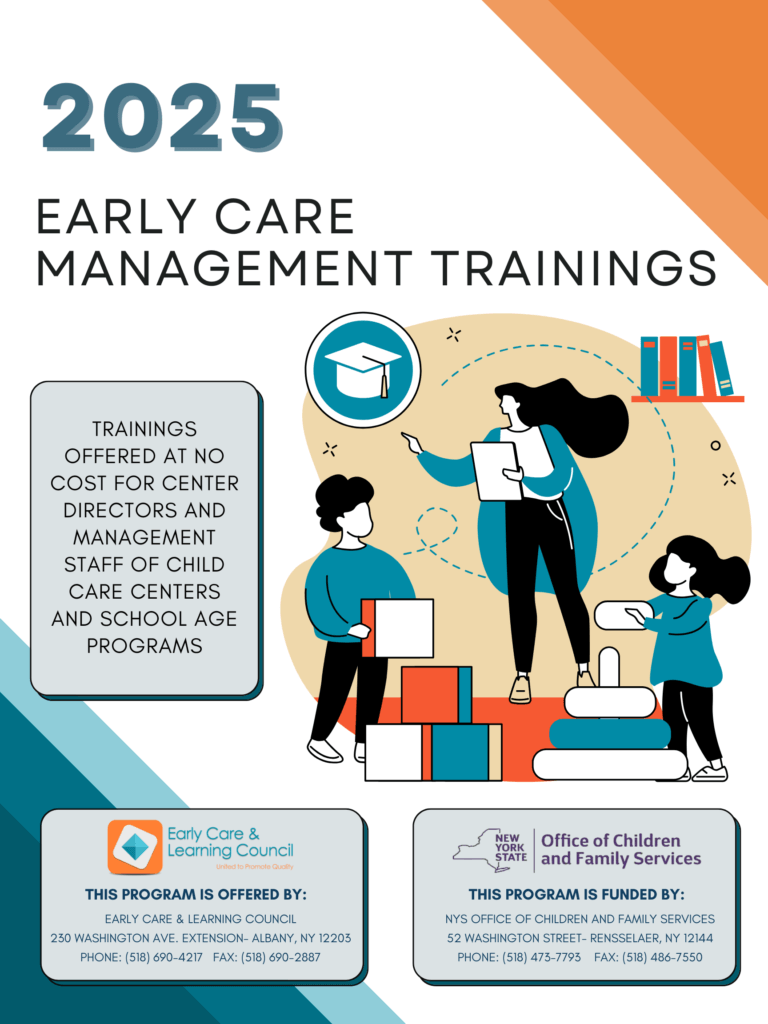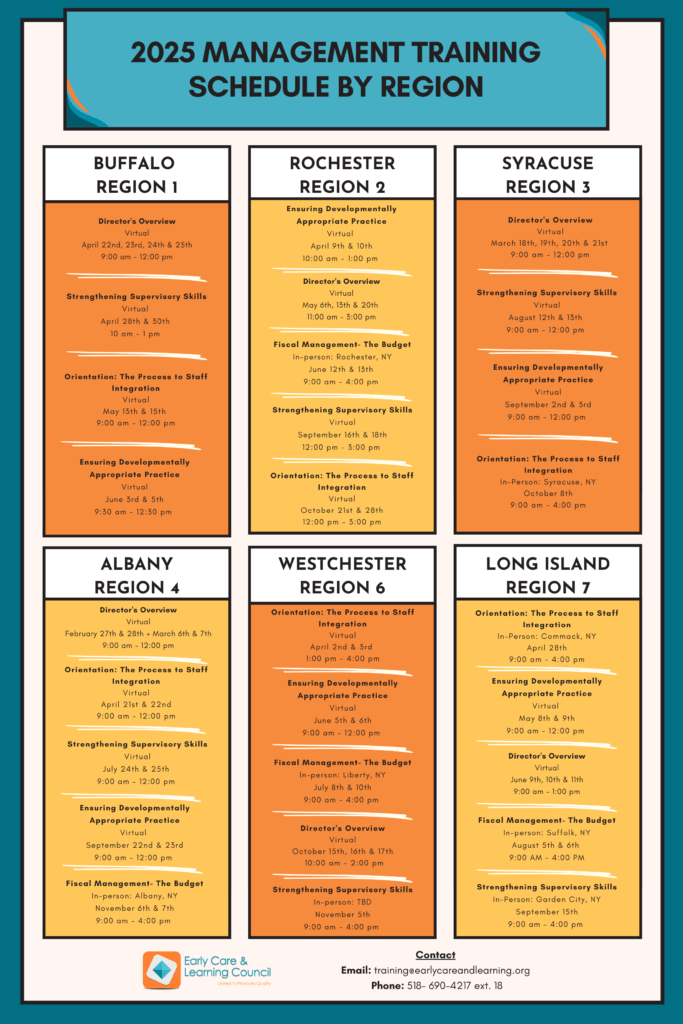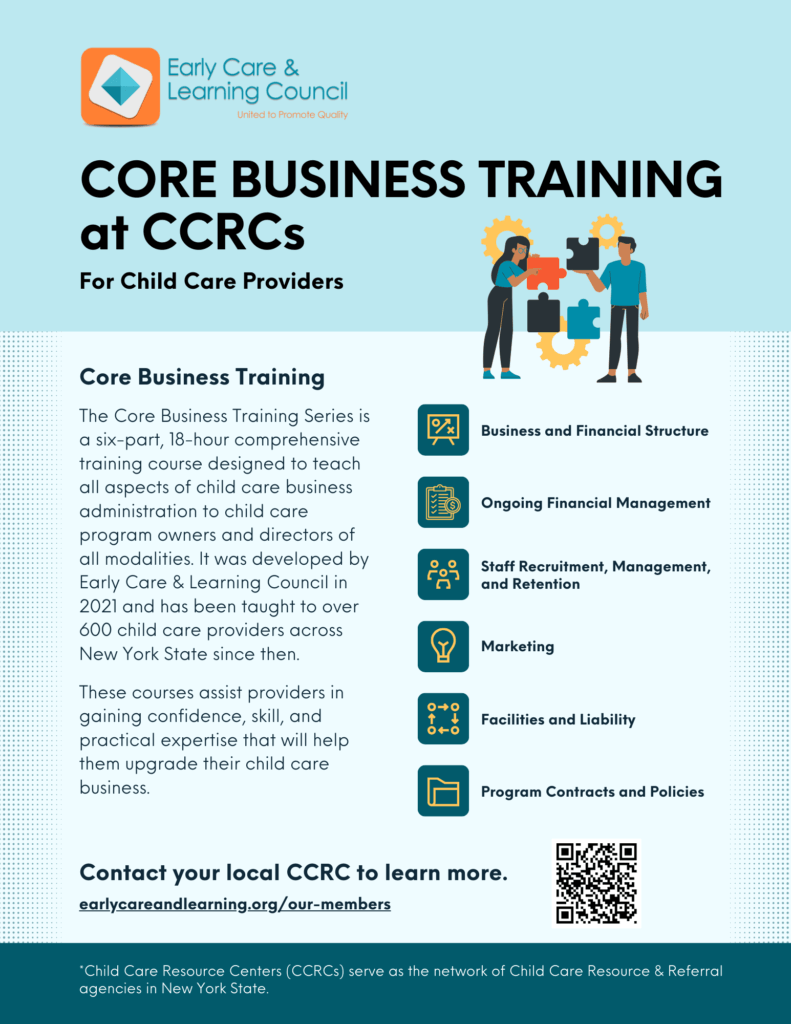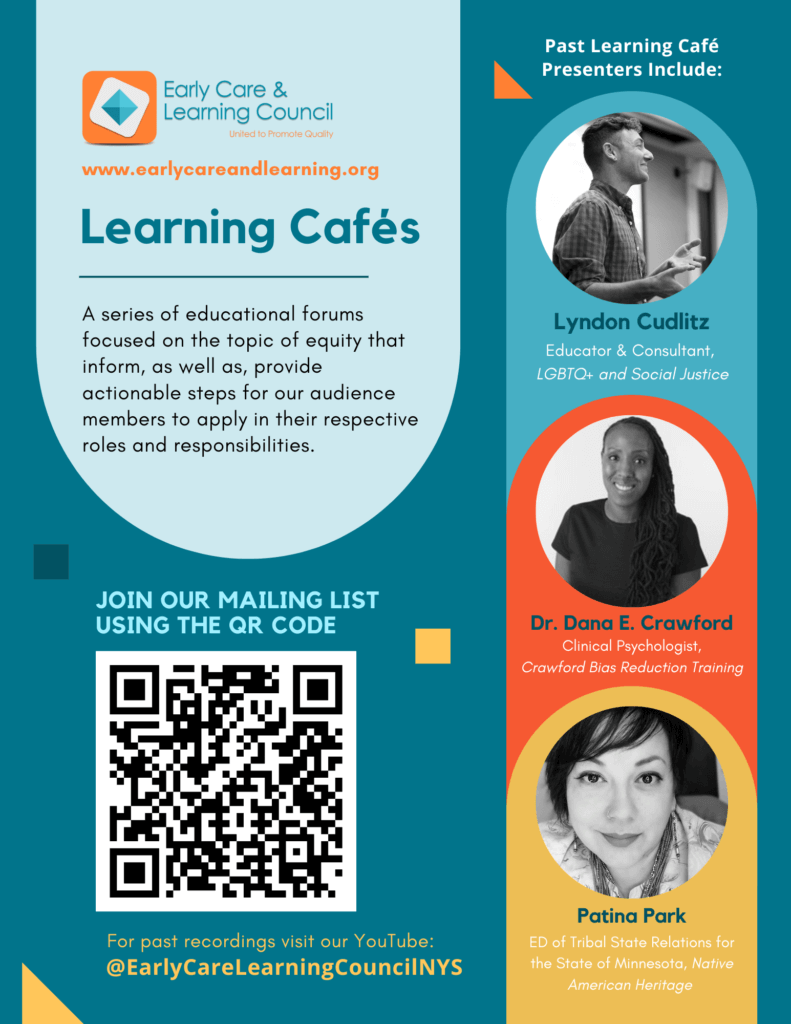Professional Development
ECLC offers a variety of virtual and in-person trainings statewide to support the child care workforce.
The Management Training Series equips directors with the skills and knowledge necessary to run high-quality, safe programs. With support from the Child Care Resource Center (CCRC), ECLC provides five core trainings funded by the New York State Office of Children and Family Services (OCFS) at no cost to participants.
The Core Business Training Series offers a comprehensive 18-hour course covering essential child care business administration topics. Since its launch in 2021, it has helped over 600 providers strengthen their business management and improve operational efficiency.
Additionally, Monthly Learning Café forums are available, featuring expert speakers on a wide range of relevant topics. These forums are open to CCRCs, child care providers, and others interested in engaging in discussions that impact the work being done across New York to support families.
For more details, please see below with corresponding printable resources.
Meet Our Trainers





Abbe Hahn
Associate Executive Director of Programs & Services
NYS-TTAP Credential
Brooke Ricci
Director of Professional Development
NYS-TTAP Credential
Mariah King
Member Services Coordinator
NYS-TTAP Credential
Kayla Teabout
Professional Development Coordinator
Content Specialist
Andria Ryberg
Director of Child Care Supply
Content Specialist
Our Training
Early Care & Management Training
ECLC’s Management Training Series supports child care center directors in all counties across the state by training both new and experienced child care center directors in all topics essential to running a safe, high quality program.
ECLC staff trainers and Child Care Resource Center (CCRC) trainers offer a statewide calendar of virtual and in-person Management Training for Child Care Center and School Age Care Directors. ECLC provides five core Management Trainings:
Director's Overview
This training is designed for Directors who have been in their position for 24 months or less as well as those needing a refresher course on the roles of a Director. The training focuses on a lateral exploration of key topics in Leadership and Management with small group discussion, lecture, and interactive elements. Topics covered include: Regulations, Leadership, DAP, Emergent Trends, Family Connections, Ethics, and many others. Learn and network with other new Directors and explore administrative tools in this exciting introduction to the complex dynamic of Early Childhood Administration.
In-person delivery consists of two 7-hour days (which includes 1 hour for lunch); Virtual delivery consists of up to four 3-4 hour days.
OCFS Areas: 1, 3, 7 and CBK Areas: 1, 2, 4, 6
12 Hours of Training Credits
Fiscal Management: The Budget
While there are many components of fiscal management, this training will focus on the cornerstone – The Budget. Without a budget based on sound and realistic financial expectations, it is impossible to provide quality child care services to your community. Many Directors, having come up through the ranks of the teaching staff, have not had the opportunity to receive formal instruction on developing and managing a budget. This two-day training is designed to give or refresh Directors in the steps necessary to provide oversight to the fiscal aspects of the center program.
This training will focus on the aspects of developing a realistic budget. Throughout the process of creating this budget, we will continually discuss the fiscal impact of your center’s choices and goals. Together, we will also identify ways to meet the common challenge of providing quality care. In order to meet this challenge, we will look at the fiscal impact of staffing patterns, a method for projecting realistic income, how to create a program budget, how to calculate the cost of care, and how to set fees at appropriate levels. We will conclude with the tools of good budget management.
In-person delivery consists of two 7-hour days (which includes 1 hour for lunch); Virtual delivery consists of up to four 3-4 hour days.
OCFS Areas: 3, 5 and CBK Area: 7
12 Hours of Training Credits
The Director's Role in Ensuring Developmentally Appropriate Practice
Directors make decisions based on their knowledge of early childhood education and current child development theories and research. They guide curriculum development by building and leading an early childhood team. The term Developmentally Appropriate Practice (DAP) was originally coined by the National Association for the Education of Young Children (NAEYC). In order to ensure quality, this training explores five key areas of Developmentally Appropriate Practice: shared vision and center goal setting, child development, observation and assessment, lesson plan development and appropriate materials. The training will assist directors in meeting the developmental needs of each child by implementing a purposeful and relationship-based curriculum. Participants will have the opportunity to explore tools and methods of guiding staff to ensure meaningful learning experiences based on the individual needs of the child as well as work within the context of realistic developmental stages. In addition, Directors will be supported in the process of leading and guiding staff to incorporate their experiences and cultural backgrounds into a diverse, developmentally appropriate curriculum.
In-person delivery consists of one 7-hour day (which includes 1 hour for lunch); Virtual delivery consists of up to three 2-3 hour days.
OCFS Areas: 1, 3, 5 and CBK Areas: 2, 3, 4
6 Hours of Training Credits
Orientation: The Process to Staff Integration
Hiring and recruiting staff is one of the biggest challenges that Child Care Directors face today in early care and education. It is a challenge finding qualified, dedicated, and knowledgeable staff while maintaining a high-quality center as well as maintaining staff/child ratios. Once we find staff, we want them to learn and succeed, which will ensure that the children in the program are learning and are successful. Often, we find ourselves hiring staff and having them start immediately in the classroom (on-the-job training) with a scant orientation. With the “sink or swim” mentality the new teacher/staff will often sink. At this training, we will explore the value of creating a progressive orientation process as a way to fully integrate teachers/staff into your program. We will focus on the hiring and orientation process as a method for retaining staff. We will discuss ways to lead new teachers/staff to become a part of your team with a common mission and vision.
In-person delivery consists of one 7-hour day (which includes 1 hour for lunch); Virtual delivery consists of up to three 2-3 hour days.
OCFS Areas: 3, 5 and CBK Areas: 7
6 Hours of Training Credits
Strengthening Supervisory Skills
Reflecting on and strengthening one’s supervisory skills is perhaps the most important responsibility of the center director. Directors have the challenge of negotiating and meeting the needs of staff, parents, children, and many times, board members, as well as owners. Having well-developed supervisory skills will greatly enhance the Director’s ability to successfully meet this challenge.
This training will focus on the skills and strategies necessary for effective team building and leadership. The importance of trust, conflict resolution, commitment, accountability, and attention to quality will be discussed, as will methods to foster these things with and among the staff. We will also address tailoring your communication style, ensuring developmentally appropriate practice and effectual delegation. The numerous considerations involved in assessing and intervening in performance problems will be described, and a systematic approach for addressing these considerations will be introduced. Participants will then have an opportunity to apply this approach to a specific performance dilemma by carefully analyzing the nature of the problem and the potential solutions.
In-person delivery consists of one 7-hour day (which includes 1 hour for lunch); Virtual delivery consists of up to three 2-3 hour days.
OCFS Areas: 3, 5 and CBK Areas: 6, 7
6 Hours of Training Credits
These trainings are funded by the New York State Office of Children and Family Services (OCFS) and offered to all center directors and CCRCs staff members at no cost.
Core Business Training Series
The Core Business Training Series is a six-part, 18-hour comprehensive training course designed to teach all aspects of child care business administration to child care program owners and directors of all modalities. It was developed by ECLC in 2021 and has been taught to over 600 providers across New York State since then.
These courses assist providers in gaining confidence, skills, and practical expertise that will help them improve their child care business.
Core Business Course Descriptions
Session 1: Business and Financial Structure
Participants learn about the history of child care licensing in New York State, the different child care modalities recognized in NY state, different types of business entities, and the Iron Triangle formula for financial stability of child care programs.
Session 2: Ongoing Fiscal Management
Participants learn how to establish solid financial record keeping practices for their child care businesses. This includes developing an accounting system, learning the difference between income and expenses, learning proper documentation and record keeping for all revenue and expenses, and establishing baseline revenue and expenses for their individual child care programs.
Session 3: Staff Recruitment, Management, and Retention
Participants learn about the components of a strong hiring process, an inclusive orientation period, and best practices for managing and supporting the development of child care employees.
Session 4: Marketing
Participants learn about the major elements needed in order to have a comprehensive child care marketing plan. The major elements of successful marketing are strong product, right price, right place, and strong promotion. Participants in this training learn about these elements of marketing and develop their own marketing plan.
Session 5: Facilities and Liability
Participants learn how to stay in compliance with licensing regulations regarding the health and safety of children and employees and how to mitigate risk and ensure protections for children and the business.
Session 6: Contracts and Policies
Participants learn about the basic components that all family and employee contracts should have, how to write family and employee contracts, and how to file and store family and employee contracts.
Learning Café
The Learning Cafés are a series of educational forums for the Child Care Resource Center network, aimed at providing actionable steps that participants can apply in their roles and responsibilities. These forums intentionally introduce expert speakers who present on a diverse range of topics, designed to support and align with the interests of the audience.
Learning Cafés are held on the 2nd Thursday of each month from 12-1pm and are open to the public. Dates may be subject to change based on speaker availability. Learning Cafes are not held in the months of August and December.
To view prior sessions, visit our Learning Cafe YouTube Playlist.




